new posts in all blogs
Viewing: Blog Posts Tagged with: Essay, Most Recent at Top [Help]
Results 26 - 50 of 59
How to use this Page
You are viewing the most recent posts tagged with the words: Essay in the JacketFlap blog reader. What is a tag? Think of a tag as a keyword or category label. Tags can both help you find posts on JacketFlap.com as well as provide an easy way for you to "remember" and classify posts for later recall. Try adding a tag yourself by clicking "Add a tag" below a post's header. Scroll down through the list of Recent Posts in the left column and click on a post title that sounds interesting. You can view all posts from a specific blog by clicking the Blog name in the right column, or you can click a 'More Posts from this Blog' link in any individual post.

By: Rachel Scheller,
on 12/4/2012
Blog:
Guide to Literary Agents
(
Login to Add to MyJacketFlap)
JacketFlap tags:
Writing Your First Draft,
Craft & Technique,
There Are No Rules Blog by the Editors of Writer's Digest,
Haven't Written Anything Yet, Writing for Beginners,
Creative Nonfiction Writing,
Writing Short Stories & Essay Writing,
Writing Editor Blogs,
Memoir,
essay,
Excerpts,
creative nonfiction,
personal essays,
Add a tag
Powerful, surprising, and fascinating personal essays are also “reader-friendly essays” that keep the reader squarely in focus. So how do you go about writing one? In this excerpt from Crafting the Personal Essay, author Dinty W. Moore shares a variety of methods for crafting an essay that keeps the reader’s desires and preferences in mind, resulting in a resonate and truly memorable piece. As Moore says, “Privacy is for your diary. Essays are for readers.”

Writing the Reader-Friendly Essay
Good writing is never merely about following a set of directions. Like all artists of any form, essay writers occasionally find themselves breaking away from tradition or common practice in search of a fresh approach. Rules, as they say, are meant to be broken.
But even groundbreakers learn by observing what has worked before. If you are not already in the habit of reading other writers with an analytical eye, start forming that habit now. When you run across a moment in someone else’s writing that seems somehow electric on the page, stop, go back, reread the section more slowly, and ask yourself, “What did she do here, put into this, or leave out, that makes it so successful?”
Similarly and often just as important, if you are reading a piece of writing and find yourself confused, bored, or frustrated, stop again, back up, squint closely at the writing, and form a theory as to how, when, or where the prose went bad.
Identifying the specific successful moves made by others increases the number of arrows in your quiver, ready for use when you sit down to start your own writing. Likewise, identifying the missteps in other writers’ work makes you better at identifying the missteps in your own.
Remember the Streetcar
Tennessee Williams’ wonderful play, A Streetcar Named Desire, comes from a real streetcar in New Orleans and an actual neighborhood named Desire. In Williams’ day, you could see the streetcar downtown with a lighted sign at the front telling folks where the vehicle was headed. The playwright saw this streetcar regularly—and also saw, of course, the metaphorical possibilities of the name.
Though this streetcar no longer runs, there is still a bus called Desire in New Orleans, and you’ve certainly seen streetcars or buses in other cities with similar, if less evocative, destination indicators: Uptown, Downtown, Shadyside, West End, Prospect Park.
People need to know what streetcar they are getting onto, you see, because they want to know where they will be when the streetcar stops and lets them off.
Excuse the rather basic transportation lesson, but it explains my first suggestion. An essay needs a lighted sign right up front telling the reader where they are going. Otherwise, the reader will be distracted and nervous at each stop along the way, unsure of the destination, not at all able to enjoy the ride.
Now there are dull ways of putting up your lighted sign:
This essay is about the death of my beloved dog.
Or:
Let me tell you about what happened to me last week.
And there are more artful ways.
Readers tend to appreciate the more artful ways.
For instance, let us look at how Richard Rodriguez opens his startling essay “Mr. Secrets”:
Shortly after I published my first autobiographical essay seven years ago, my mother wrote me a letter pleading with me never again to write about our family life. “Write about something else in the future. Our family life is private.” And besides: “Why do you need to tell the gringos about how ‘divided’ you feel from the family?” I sit at my desk now, surrounded by versions of paragraphs and pages of this book, considering that question.
Where is the lighted streetcar sign in that paragraph?
Well, consider that Rodriguez has
- introduced the key characters who will inhabit his essay: himself and his mother,
- informed us that writing is central to his life,
- clued us in that this is also a story of immigration and assimilation (gringos), and
- provided us with the central question he will be considering throughout the piece: Why does he feel compelled to tell strangers the ins and outs of his conflicted feelings?
These four elements—generational conflict between author and parent, the isolation of a writer, cultural norms and difference, and the question of what is public and what is private—pretty much describe the heart of Rodriguez’s essay.
Or to put it another way, at every stop along the way—each paragraph, each transition—we are on a streetcar passing through these four thematic neighborhoods, and Rodriguez has given us a map so we can follow along.
Find a Healthy Distance
Another important step in making your personal essay public and not private is finding a measure of distance from your experience, learning to stand back, narrow your eyes, and scrutinize your own life with a dose of hale and hearty skepticism.
Why is finding a distance important? Because the private essay hides the author. The personal essay reveals. And to reveal means to let us see what is truly there, warts and all.
The truth about human nature is that we are all imperfect, sometimes messy, usually uneven individuals, and the moment you try to present yourself as a cardboard character—always right, always upstanding (or always wrong, a total mess)—the reader begins to doubt everything you say. Even if the reader cannot articulate his discomfort, he knows on a gut level that your perfect (or perfectly awful) portrait of yourself has to be false.
And then you’ve lost the reader.
Pursue the Deeper Truth
The best writers never settle for the insight they find on the surface of whatever subject they are exploring. They are constantly trying to lift the surface layer, to see what interesting ideas or questions might lie beneath.
To illustrate, let’s look at another exemplary essay, “Silence the Pianos,” by Floyd Skloot.
Here is his opening:
A year ago today, my mother stopped eating. She was ninety-six, and so deep in her dementia that she no longer knew where she was, who I was, who she herself was. All but the last few seconds had vanished from the vast scroll of her past.
Essays exploring a loved one’s decline into dementia or the painful loneliness of a parent’s death are among the most commonly seen by editors of magazines and judges of essay contests. There is a good reason for this: These events can truly shake us to our core. But too often, when writing about such a significant loss, the writer focuses on the idea that what has happened is not fair and that the loved one who is no longer around is so deeply missed.
Are these emotions true?
Yes, they are.
Are they interesting for a reader?
Often, they simply are not.
The problem is that there are certain things readers already know, and that would include the idea that the loss of a loved one to death or dementia is a deep wound, that it seems not fair when such heartbreak occurs, and that we oftentimes find ourselves regretting not having spent more time with the lost loved one.
These reactions seem truly significant when they occur in our own lives, and revisiting them in our writing allows us to experience those powerful feelings once again. For this reason it is hard to grasp that the account of our loss might have little or no impact on a reader who did not know this loved one, or does not know you, and who does not have the emotional reaction already in the gut.
In other words, there are certain “private” moments that feel exhilarating to revisit, and “private” sentences that seem stirring to write and to reread as we edit our early drafts, but they are not going to have the same effect in the public arena of publishable prose.
Final Thoughts
In the last twenty years of teaching writing, the most valuable lesson that I have found myself able to share is the need for us as writers to step outside of our own thoughts, to imagine an audience made up of real people on the other side of the page. This audience does not know us, they are not by default eager to read what we have written, and though thoughtful literate readers are by and large good people with large hearts, they have no intrinsic stake in whatever problems (or joys) we have in our lives.
This is the public, the readers you want to invite into your work.
Self-expression may be the beginning of writing, but it should never be the endpoint. Only by focusing on these anonymous readers, by acknowledging that you are creating something for them, something that has value, something that will enrich their existence and make them glad to have read what you have written, will you find a way to truly reach your audience.
And that—truly reaching your audience and offering them something of value—is perhaps as good a definition of successful writing as I’ve ever heard.
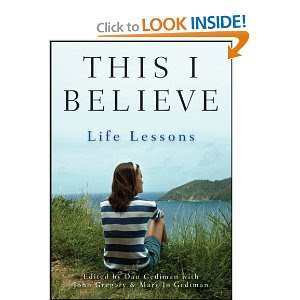
WOW! Women on Writing’s very own Jodi Webb recently read her essay, “If You Don’t Do It, Who Will?” on public radio. We chatted with her briefly about her experience submitting and recording her piece.
Check out her essay and recording here, then get the inside scoop from Jodi about creating an essay that gets broadcast on the airwaves.
WOW: Jodi, congratulations for having your essay featured on public radio! What inspired you to submit a “This I Believe” essay?
Jodi: I had always been aware of the This I Believe segment because I'm a big fan of Edward R. Murrow. Murrow was the one who first started the program. You can submit essays for consideration online and over the years I've submitted an essay or two. After all, the title says it all "This I Believe". It's a natural writing prompt and brings so many ideas to mind. What do we believe in? I could think of a different answer every day of my life.
But I was always nervous about the recording aspect of This I Believe. So when I heard that they were looking for submissions for a This I Believe book I was very enthusiastic. No recording! So I pulled out all the stops and submitted an essay about my mom and volunteering.
WOW: What was the submission process like, and how long did it take to hear that your essay was accepted?
Jodi: It was one of those "dropping a pebble in a wishing well" submissions. I submitted it and, aside from the automated "We've received your submission" email, nothing--for months! I actually forgot about it when I got an email from John Gregory telling me it had been selected for the book. I was so excited. Of course then more waiting until the book was finally published and ended up in my mailbox. About a year from submission to actual book.
Of course then I learned that they intended to have everyone included in the book record their essays. What?! I was very nervous and actually tried to stall them for a while but John was persistent.
WOW: How did the recording take place? Did you practice your reading of the piece?
Jodi: Normally NPR schedules time for you to visit a local radio station that broadcasts NPR programs and record it in their studio. But the nearest NPR station was an hour from my house. I had to cancel once for snow but finally made it the station in Harrisburg, PA. It was a HUGE building. There was a great guy there named Joe who was my man on the spot. Then I had John from NPR on the phone giving me direction. So I had earphones on, a mike in front of me, Joe sitting across from me working the technical aspects(playing sections back for me, etc.) and both of them talking to me through the earphones in this tiny little room. It was so weird.
First, John asked me all these questions about my writing and my family. I suppose to get me accustomed to the microphone. Then I read the entire thing three times (the first time at super speed!), but I also read just sections and a few sentences what seemed like a million times. They can take a bit from here and a bit from there and splice it all together. Which was a relief because at least I didn't have to read the entire thing perfectly in one shot! John would say thin
Elora Writers' Festival invites entries for their 9th annual writing competition. Prizes: $200, $100, $75 (4 age categories). Submit: Short story/personal essay (1500 words max.) and poetry (75 lines max). Deadline: April 27, 2012. Entry fee $15 (writers 20+ only).
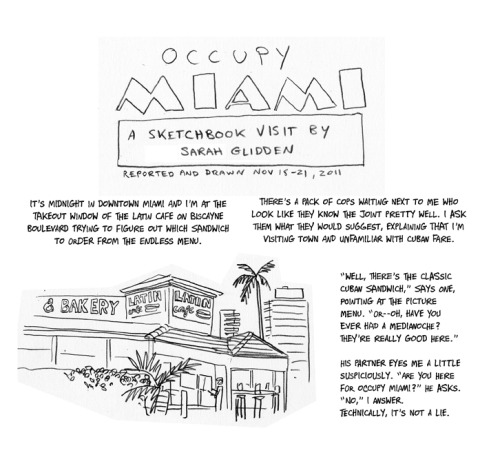
This is the second installment of our ‘Occupy Sketchbook’ series, a sketchbook essay from Sarah Glidden on Occupy Miami from the Novemer 17 Day Of Action marking two months since protests began on Wall Street. (via Cartoon Movement)


By: Maryann Yin,
on 3/31/2011
Blog:
Galley Cat (Mediabistro)
(
Login to Add to MyJacketFlap)
JacketFlap tags:
Authors,
memoir,
Lit Crit,
essay,
Mark Medley,
book hoarding,
bibliomaniac,
Dirty Secret,
hoarder,
Jessie Sholl,
Add a tag
 In a Psychology Today essay, Dirty Secret: A Daughter Comes Clean About Her Mother’s Compulsive Hoarding author Jessie Sholl criticized Mark Medley‘s “Confessions of a Book Hoarder” essay as “flippant and smirky.”
In a Psychology Today essay, Dirty Secret: A Daughter Comes Clean About Her Mother’s Compulsive Hoarding author Jessie Sholl criticized Mark Medley‘s “Confessions of a Book Hoarder” essay as “flippant and smirky.”
Sholl (pictured, via) wrote about how we misuse the term “hoarder” in popular culture–disrespecting people who suffer from the mental disorder. What do you think?
Sholl explained: “Just because you have a lot of books, that doesn’t mean you’re a bibliomaniac. Can you walk through the room in which your books are stored? Have you depleted any of your life savings on these books? … Since my memoir came out, numerous people have confessed to me that they think they’re hoarders, too … you might have packed bookcases and, yes, too many books, but that doesn’t mean you’re a book hoarder.”
New Career Opportunities Daily: The best jobs in media.
I wrote 5000 words about writing 100,000 words. Here’s my essay on In the Library with the Lead Pipe about thoughts I had on writing for print in an era of digital content.
Teen writers, we need you! Throughout the month of March, we’ll feature writers (from 13 to 18 y-o) sharing their life-changing stories. In 500 words or less, tell us how Jesus has touched your life. All entries must be received by February 28, 2011 in order to qualify. For awesome writing tips and helps check out Caleb Breakey’s site (http://www.calebbreakey.com/). The winning entry shall receive a $50 Amazon.com gift certificate and be featured all Easter Week. (Winners drawn at random).
To enter click here.
Listening to Teens
Yesterday, I taught writing to a dozen at-risk teens. We worked on a personal narrative for about 4-5 hours. Now, the kids didn’t want to be there, but had to be. They didn’t want to write, because it’s summer and who wants to do English class in the summer.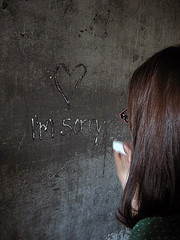
For the first fifteen minute writing period, one teen just wrote, “I’m bored, I don’t want to do this,” for the entire time. I gave the teen permission to do this, as long as the pen kept moving over the page. Wrong way to phrase it. Another teen moved his pen, but doodled.
The writing process I did with them was varied, active, loud, unruly, and (at least for me) fun. And the last 20 minute period, when I asked them to take their marked-up, full of revisions drafts and write out a clean copy (except I didn’t care about spelling and punctuation - hey, it wasn’t English class), everyone wrote. Even the doodler and the bored.
After a loud day, I was suddenly quiet and serious as I explained that my passion is to help people write better, but the process wasn’t complete until the circle is closed with a listener. Would anyone want to read aloud? Because I wanted to hear each voice.
I don’t know how many times these teens had been told that someone wanted to listen to their voice. Not many times, I suspect. It was a serious moment, broken quickly by a raucous joke. Yet - maybe it touched them. Only a few were brave enough to read aloud. Later, though, while they were playing cards the last few minutes, I went to each and asked if I could read his/her story. They all said yes.
There were great stories, not-so-great stories, stories which were rendered almost incoherent by so many grammar problems, stories meant to shock, stories meant to reveal, stories meant to hide - but the voices were loud and clear. I am here. I matter. Is anyone listening?
That’s why we write for kids and teens. Because they matter. Because we want to give them voices that can be heard.
Post from: Revision Notes
Revise Your Novel!
Copyright 2009. Darcy Pattison. All Rights Reserved.
Related posts:
- muttering
- Twisted voices
- 5 Writing Tasks for Off Days

By: bfletcher,
on 1/31/2009
Blog:
places for writers
(
Login to Add to MyJacketFlap)
JacketFlap tags:
contest,
poetry,
Contests,
poem,
essay,
Young Writers,
youngwriters,
youngadults,
Deadlines: May 09,
Add a tag
Elora Writers' Festival invites entries for their 6th annual writing competition. Prizes: $100, $75, $50 (Adults). Age categories: adult, teen (13-19), junior (12 and under). Submit: Short story/personal essay (2000 words), poetry (75 lines max), or one-act plays. Entry fee: $10. Open theme. Deadline: May 8, 2009. More details...
Copyright © by René Colato Laínez
 “Today you can make a Christmas card,” said Mrs. Allen, my ESL teacher.
“Today you can make a Christmas card,” said Mrs. Allen, my ESL teacher.
“What is Cris-más?" I asked her.
“¡Navidad!” chanted Carlos and Josue behind me.
I turned around. There they were making funny faces at me. They always did that when I asked the teacher a “dumb” question.
“I can do a tarjeta de Navidad,” I said, and got a pencil and piece of white construction paper. I folded the paper in half. “I know what to do,” I said to myself.
I drew a circle and added long pointed petals around it. I colored the flower with my red marker. I drew two other pascuas and a candle on the card. Looking at my pascuas, I remembered my Mamá and I collecting pascuas in San Salvador.
We did not have a garden but Mamá needed the pascuas to take them to la Virgen de Guadalupe the next day, on December 12th. Mamá promised las pascuas to la Virgen. She was coming to the USA the following month and those pascuas were very important for her. La Virgen would help her on her way to the USA, and she would also protect my brothers, Papá and I who had to stay behind in El Salvador. But she would need to find the pascuas and take them to the Basílica de Guadalupe in San Salvador. Where could we find the pascuas? At el mercado for sure, but we did not have money.
“Let’s go to a rich person's house,” Mamá said. “It is December and for sure they will have some pascuas.”
We climbed down the flight of stairs, crossed the broken bridge, passed some cardboard houses and el mercado. Then we took a bus to Colonia Escalón. In an hour, we were in front of a rico's house. We looked through the iron gate and saw pascuas plants.
“This house looks so pipirisnais, very elegant,” Mamá said. “I am afraid to even knock.”
Soon some dogs were barking at us and a lady peeked through a window.
“¿Qué quieren? Go away or I will call the police,” she cried.
“Vámonos,” Mamá said. “I told you.”
 I said, “We need some pascuas to take it to la Virgen de Guadalupe. My mom made a promise and wants to take some pascuas tomorrow to la basilica.”
I said, “We need some pascuas to take it to la Virgen de Guadalupe. My mom made a promise and wants to take some pascuas tomorrow to la basilica.”
The woman ran to the gate. “If it is for la Virgen, take as many as you want,” she said.
So, the following morning we took las pascuas to la Virgen. My mother prayed at the altar and asked for protection for her and her children.
“René, René!” Mrs. Allen said touching my shoulder. “Pay attention.”
I jumped from my seat and Carlos and Josue giggled. “René is on the moon!” they chanted together.
“Mrs. Allen, look!” I showed her my card.
“You need to write something inside,” she said.
I rubbed my head. “What should I write? Feliz Navidad? But it must be in English.” I knew that feliz was happy, so I wrote “Happy Christmas.”
Carlos and Josue looked at my card and made dumb faces. “That’s wrong! It is not Happy Christmas. It is Merry Christmas.”
“Mary Christmas! You are crazy. It cannot be María Navidad.”
“No es Mary like María. It is Merry Christmas.”
“Marry Christmas! La Navidad no se va a casar. It is not getting married,” I told them, as the bell rang.
“Believe us!” Carlos and Josue told me on the playground.
I shook my head. I had been in trouble before for listening to Carlos and Josue. When I met them on the first day on the school bus, they wanted to teach me how to say, “Me llamo René” in English.
“You have to say ‘Me llamo René,’ many times today. You better practice,” they said.
“Repeat,” they told me. “I am dumb René.”
“Eso está difícil,” I said, and started to repeat after them.
When we arrived at school, they patted me on my back. “You will learn English very fast with us,” they said.
On my first day of school I was the dumb René. Now Carlos and Josue were lairs, and I did not believe anything they said.
But what if Happy Christmas was not right? Well, I had another option. I could write, “Felices fiestas, Happy parties.” But parties did not sound good. It was not a party like a birthday party. It was an important fiesta. Then I had a great idea. I could write, “Felices pascuas.”
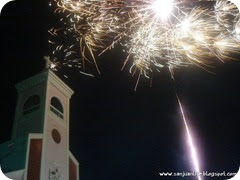 Everyone said "Felices pascuas" at midnight on Christmas Eve in El Salvador.
Everyone said "Felices pascuas" at midnight on Christmas Eve in El Salvador.
“Felices pascuas,” and then a kiss.
“Felices pascuas,” and a big hug.
“Felices pascuas,” and a gift from el padrino.
Yes, Felices pascuas, while the midnight sky looked so bright with so many fireworks, when the booming sounds did not scare anybody because everyone knew they were cuetes and not bullets from guns or rifles. I ran to my desk to write “Felices pascuas”.
I wrote “Happy” on the card. “How do I write pascuas?” I asked myself.
I looked at Carlos and Josue. For sure not ask them, for they might say pascuas was a pair of stinky chanclas or an old underwear. I looked in my English/Spanish dictionary but pascua was not in there. Should I write “Happy Flowers?” But flowers were flores and not pascuas. I went to my teacher’s desk to ask her for her fat English/ Spanish dictionary.
“Good for you René, you can take it,” she answered.
Soon enough I had a long word in front of me--poinsettia--a long and strange name for pascua. But I was happy because I had found my word!
I wrote with different colors, “Happy Poinsettias for my teacher Mrs. Allen.”
Then I walked to her desk and told her, “It is for you, Teacher.” She opened it and gave me a hug. “This is the way we say 'Feliz Navidad' in El Salvador--Felices pascuas,” I told her.
“René, you have worked so hard today, and you are right: pascuas are poinsettias,” she said and took a big Santa Claus sticker from her treasure box. “This is for you.”
Carlos and Josue stood up and said at once, “Happy poinsettias, Teacher. Happy poinsettias.”
When the school bell rang, Mrs. Allen told me, “Don’t go yet. Do you know who José Feliciano is?”
I nodded. “He is a singer, un cantante.”
“Yes, he is! Have you heard his Christmas song?”
I shook my head.
She smiled and opened a drawer. “Let’s listen to this song.”
Mrs. Allen played the song, and José Feliciano’s voice filled the classroom. I started singing with Mrs. Allen:
“Feliz Navidad, Feliz Navidad,
Prospero Año y Felicidad.
I wanna wish you a Merry Christmas,
I wanna wish you a Merry Christmas
from the bottom of my heart."
“Merry Christmas,” I said to Mrs. Allen.
“Merry Christmas, René,” she said. “You can take the tape home and learn the song. Tomorrow you can teach it to all the students. We will sing it for the Christmas show.”
“Yes, Teacher,” I told her, and ran to catch the school bus.
I waved to the bus driver to stop and sat down behind Carlos and Josue. They started to tease me, but I did not listen. I had extra homework to do, to teach the song to Mamá and Papá and also to my brothers in El Salvador. I would call them and say, “I know a song in English. Listen.”
They would be very proud of me!
Happy Poinsettias to all the La Bloga readers. That’s another way to say Feliz Navidad.
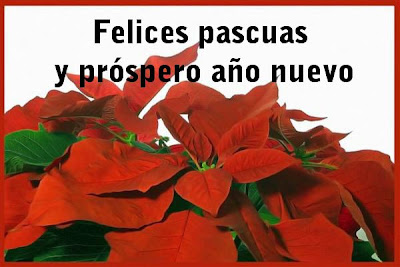
Memoirs Ink is looking for original, well-written personal essays, memoirs, or stories that are based on autobiographical experiences for its Half-Yearly Personal Essay Contest. Narrative must be in first person. Open to any writer, any age, writing in English. Length: 1500 words max. Entry fee: US$15. First prize: US$1000; more prizes available. Deadline: February 15, 2009. More details...
The Writer's Block, a newly-created online literary magazine, is seeking submissions of poetry, prose, non-academic essays, reviews, photography and artwork for its premiere edition. Deadline: November 15, 2008. More details...
I've been thinking a lot about art-making, about ownership of art and the internet. One of the things I love about the 'net, and here I mean NON-PROFIT blogging, non-profit journals, etc., is the way in which it snatches the creation and analysis of culture from corporate control. It unchains criticism from the side of the elite, snatches it from the dominant culture and puts it in the hands of everyday people. It is incredibly democratic, populist, and as such, subversive.
I remember in graduate school catching high holy hell for my love of sampling, of the ways that hip hop artists take from the past and fuse it into something else. (And yes, Virginia, where there's a buck to be made, I wholeheartedly support recording artists, visual artists and writers getting their due.) But there is something about participatory culture, communal creation that keeps grabbing people by the throat, blurring the boundaries, something irresistible.
A while back I read a book that made me think about art as commodity, art as communal property and here are my thoughts about the book and its ideas.

 "Fan fiction is a way of the culture repairing the damage done in a system where contemporary myths are owned by corporations instead of owned by the folk." --- Henry Jenkins
"Fan fiction is a way of the culture repairing the damage done in a system where contemporary myths are owned by corporations instead of owned by the folk." --- Henry Jenkins "Get a life," William Shatner told Star Trek fans. Yet, in Textual Poachers, Henry Jenkins makes the case that fans already have a "life," one that gleans from popular culture, then revisions and redrafts its ownership into something akin to new mythology. Further, it is a consumer-driven culture, one outside the control of the corporate universe. I was initially drawn to this book in its exposition, when I read Jenkins' repudiation of fans as cultural dupes, social misfits, mindless TV and movie junkies. Jenkins, Director of the MIT Comparative Media Studies Program at MIT, author of: Textual Poachers, Fans, Bloggers, and Gamers, Convergence Culture: Where Old and New Media Collide, makes a well-argued case than fans are active participants in a burgeoning underground of cultural consumerism as "owners."
"Get a life," William Shatner told Star Trek fans. Yet, in Textual Poachers, Henry Jenkins makes the case that fans already have a "life," one that gleans from popular culture, then revisions and redrafts its ownership into something akin to new mythology. Further, it is a consumer-driven culture, one outside the control of the corporate universe. I was initially drawn to this book in its exposition, when I read Jenkins' repudiation of fans as cultural dupes, social misfits, mindless TV and movie junkies. Jenkins, Director of the MIT Comparative Media Studies Program at MIT, author of: Textual Poachers, Fans, Bloggers, and Gamers, Convergence Culture: Where Old and New Media Collide, makes a well-argued case than fans are active participants in a burgeoning underground of cultural consumerism as "owners."
These owners are skillfully producing new genres, i.e., fan fic, as well as being a kind of nomadic poacher, constructing mythology, alternative social communities, and cultural representation. Having attended fan conventions, corresponded with fans via websites and Listservs, he offers an insider's perspective. Approaching this as an ethnographic study, Jenkins is able to identify major areas of fan interest (Star Trek, Beauty and the Beast, Alien Nation, etc.)
Given the date of publishing, Jenkins did not have access to the blowup in fandom that occurred after the first two seasons of the X-FIles, when it moved from cult favorite to cultural phenomena, to say nothing of the fandoms surrounding today's cult hits, Battlestar Gallactica, Lost, Heroes.
In addition, he describes the fan community as initially white and female. Although now, more and more men and people of color are swelling the ranks of fanfic, and there seems to be gender and racial parity in the blogging community. Further, according to Jenkins, fan groupings contain more working-class and middle class people than other "art" related constituencies. He goes on to say some more intriguing things.
That the fan community sees itself in opposition to the capitalist control of culture, choosing to create what he terms meta-stories. Meta-stories are the online writing of non-industry people, based on television shows and movies. Through these meta-stories or fan fic, fans clearly express alternative "ownership," and in fact, have begun to impact the original "producers." For example, Jenkins reports that several studios monitor fan websites in order to gauge trends when considering television or movie sequels. In addition, fic writers push the envelop for what themes their favorite icons now contain. Fic writing has dealt with: alternative endings/or plot extensions of film and televison series, explicit sexuality, queer-oriented alternate plots, gender roles, and the construct of emerging literary genres, etc. And we have only to look at the surge of interfacing today between "hard" network broadcasting, pod casts, film and TV episode downloads with alternate content, to see a major shift in how pop culture, already underway full steam, is experienced.
As a fan (X-Files) and fic writer myself, I found it a useful delineation of a fiercely loyal, now international, subculture of renegade consumers of culture. Everyday people are becoming outlaw storytellers, seizing modern-day archetypes and making them our own.
Lisa Alvarado
Memoirs Ink is looking for well-written personal essays based on autobiographical experiences, in any genre, for their 5th annual writing contest. First prize: US$1000. Length: 3000 words max. Entry fee: US$15. Deadline: August 1, 2008. More details...
The New Quarterly (ON) invites submissions of fiction, poetry, interviews, and writing about writing. Wants to be delighted by a story well-told. Payment: $200 per short story, novel excerpt, and essay, and $30 per poem or "postscript" story. More details...
Submissions are invited for new travel 'zine Travel Thru History. Publishes travel memoirs, reflections on literary journeys, and pieces on history, archaeology, and culture. Length: 500 -1500 words. Payment: small honorarium paid on publication. More details...
RATTLE (US) seeks poetry written by cowboys and Western poets for an upcoming issue. Also seeking essays on different aspects of Cowboy/Western poetry and history of the literary tradition. Deadline: August 1, 2008. Payment: 2 copies. More details...
Toward the Light: Journal of reflective Word and Image invites entries for their 6th Annual Poetry contest. Submit rhyming or free verse poetry "that sees in the dark: personal poetry that integrates the power of light and dark in life." First prize: $175 plus publication in premiere summer edition, online publication, and two copies. Entry fee: $25 (includes subscription and 3 contest entries) or $12 for up to 3 poems. Also accepting poetry, photography, fiction, and essay submissions. Deadline: April 1, 2008. More details...
By: bfletcher,
on 3/13/2008
Blog:
places for writers
(
Login to Add to MyJacketFlap)
JacketFlap tags:
Contests,
poem,
essay,
Young Writers,
youngwriters,
Deadlines: May 08,
youngadults,
contest,
poetry,
Add a tag
Elora Writers' Festival invites entries for their 5th annual writing competition. Prizes: $100, $75, $50 (Adults) and $75, $50, $25 (Teen and Junior). Age categories:adult, teen (13-19), junior (12 and under). Submit: Short story/personal essay (2000 words) or poetry (75 lines max). Entry fee: $10. Theme: A Harvest of Words. Deadline: May 2, 2008. More details...
Leah America (US) seeks essays from people working in the sex industry for an anthology on the sex industry. Encourages submissions from current and former strippers, erotic dancers, phone sex personalities, hookers, or those with a promiscuous lifestyle. Length: 3000 words max. Deadline: March 31, 2008. Payment: one copy. No reading/publishing fees. More details...
Descant (ON) invites poetry and prose submissions for an upcoming themed issue. Submit poetry, short stories, novel excerpts, plays, essays, and interviews. Theme: Dance. Payment: $100. Deadline: July 1, 2008. More details...
By: bfletcher,
on 2/16/2008
Blog:
places for writers
(
Login to Add to MyJacketFlap)
JacketFlap tags:
poetry,
memoir,
nonfiction,
essay,
poems,
Calls,
submission,
Deadlines: March 08,
call,
Add a tag
carte blanche (Quebec Writers' Federation) is looking for poetry, fiction, and nonfiction for its spring issue. Submit odes, sonnets, free verse, short stories of all types and genres, memoirs, personal essays, book reviews, literary journalism, musings on the writing process. Length: 3500 words max. Welcomes international submissions. Deadline: March 15, 2008. More details...
The Antigonish Review is accepting poetry, fiction, article/essay, book review and translation submissions. Payment: Poetry - $30 per page; Fiction/articles/essays: $100 per page. Atlantic Canadians and Canadian writers especially encouraged to submit. Deadline: June 1, 2008.
More details...
Inscribed, an international literary magazine based in Canada, seeks traditional to experimental poetry, fiction, essays and artwork submissions. Leniency toward the interesting and the bizarre. Deadline: March 25, 2008. More details...
Memoirs Ink is looking for original, well-written personal essays, memoirs, or stories that are based on autobiographical experiences for its Half-Yearly Personal Essay Contest. Narrative must be in first person. Open to any writer, any age, writing in English. Length: 1500 words max. Entry fee: US$15. First prize: US$1100; more prizes available. Deadline: February 15, 2008 (late deadline: February 29, 2008; require additional US$5 per entry) More details...
View Next 8 Posts















I'd like to read it
Congratulations, Jodi!
Super congrats, Jodi!
How perfectly marvelous, Jodi! So proud of you!
Hope Clark
www.chopeclark.com
Really good work! Thanks a lot.
That's awesome, Jodi! You sounded like a pro! I'm so glad to hear they can take pieces of what you say and make it a cohesive recording. :) I love your essay too. It's a wonderful message to get involved, volunteer, and take responsibility. Your mom sounds like an amazing woman. Just like you. Congratulations!
This is wonderful...congrats to you!!
Wonderful story! Congratulations!